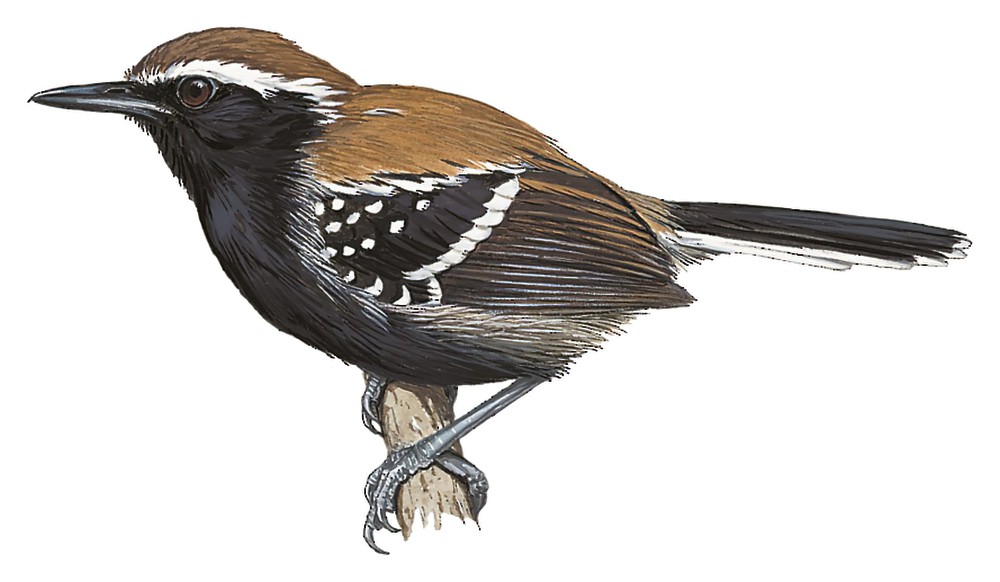Serra Antwren / Formicivora serrana

Serra Antwren
SCI Name:
Protonym: Neorhopias serrana FieldMus.Nat.Hist.Pub.Zool.Ser. Ser., 12 p.377,note
Taxonomy: Passeriformes / Thamnophilidae / Formicivora
Taxonomy Code: serant1
Type Locality: Sete Lagoas, Minas Gerais, Brazil.
Author: Hellmayr
Publish Year: 1929
IUCN Status:
DEFINITIONS
FORMICIVORA
(Thamnophilidae; Ϯ Southern White-fringed Antwren F. grisea) L. formica ant; -vorus -eating < vorare to devour; "It is at this stage of our progression that I propose to fix the limits of Thamnophilus, and pass into the genus Formicivora: here the bill is no longer robust; but narrow, slender, and more cylindrical; the under mandible weak, and the gonix nearly strait; the tail of some species is even longer and more cuneated than in the last group" (Swainson 1824); "FORMICIVORA. Rostrum mediocre, subcylindraceum, gonyde recta; vibrissæ nullæ. Alæ breves, rotundatæ, remige 4ta vel 5ta longissima. Cauda gradata. Tarsi mediocres, graciles; squamis lateralibus frequentibus. ... The Formicivoræ or Ant-Wrens, are all of them very small; and in an artificial arrangement might very well be associated with the Warblers. In all but their slender bill, they present a perfect miniature resemblance to the true Thamnophili, even to the lateral scales of their tarsi, which are small and numerous. They differ from the Drymophilæ by their comparatively short legs, which are obviously not intended for walking. We know little of their natural economy, further than that they frequent bushes and the low branches of trees, which they probably cleanse of those small insects, passed over by their more powerful brethren. ... 1. FORMICIVORA maculata. White-spotted Ant-Wren. ... 2. FORMICIVORA nigricollis. Black throated Ant-Wren. ... 3. FORMICIVORA brevicauda. Short tailed Ant-Wren." (Swainson 1825); "Formicivora Swainson, Zool. Journ., 1, 1824, p. 301, in text. Diagnosis only; species added, Swainson, Zool. Journ., 2, 1825, p. 145-149. Type, by subsequent designation, Formicivora nigricollis Swainson = Turdus griseus Boddaert (G. R. Gray, List Gen. Bds., 1840, p. 25)." (Peters, 1951, VII, p. 206).
Var. Formicivor.
Synon. Myrmecophila, Neorhopias, Stymphalornis.
formicivora
L. formica ant; -vorus -eating < vorare to devour.
● ex “Traquet Fourmilier” of Levaillant 1806, pl. 186 (Myrmecocichla).
serrana / serranus
Portuguese serra mountain range / Spanish sierra and cerro mountain range < L. serra saw.
● Serra da Esperança, Paraná, Brazil (syn. Ara maracana).
● Cerro Famatina, La Rioja, Argentina (subsp. Asthenes modesta).
● Serra de Santa Helena, Sete Lagôas, Minas Gerais, Brazil (Formicivora).
● Sierra region of Acancocha, Junín, Peru (Geocerthia).
● Sierra and puna region of Junín, Peru (Larus).
● Sierra region, alt. 9,000-14,000ft., of Peru (Turdus).
SUBSPECIES
Serra Antwren (serrana)
SCI Name: Formicivora serrana serrana
serrana / serranus
Portuguese serra mountain range / Spanish sierra and cerro mountain range < L. serra saw.
● Serra da Esperança, Paraná, Brazil (syn. Ara maracana).
● Cerro Famatina, La Rioja, Argentina (subsp. Asthenes modesta).
● Serra de Santa Helena, Sete Lagôas, Minas Gerais, Brazil (Formicivora).
● Sierra region of Acancocha, Junín, Peru (Geocerthia).
● Sierra and puna region of Junín, Peru (Larus).
● Sierra region, alt. 9,000-14,000ft., of Peru (Turdus).
Serra Antwren (interposita)
SCI Name: Formicivora serrana interposita
interposita / interpositus
L. interpositus interposed, introduced < interponere to interpose.
● "Similar to O. japonicus japonicus, but differs in having the wing and bill longer and stouter, and the coloration rather darker. It also differs from O. japonicus elegans in having the upper parts paler and less rufous in tone, and in having the wing and culmen perceptibly shorter" (Kuroda 1923) (subsp. Otus elegans).
UPPERCASE: current genus
Uppercase first letter: generic synonym
● and ● See: generic homonyms
lowercase: species and subspecies
●: early names, variants, mispellings
‡: extinct
†: type species
Gr.: ancient Greek
L.: Latin
<: derived from
syn: synonym of
/: separates historical and modern geographic names
ex: based on
TL: type locality
OD: original diagnosis (genus) or original description (species)












